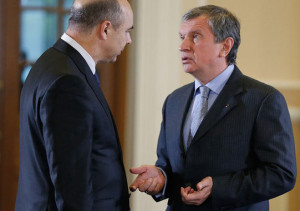
The Russian finance ministry’s proposal to increase the tax burden on the country’s oil and gas industry provoked a heated discussion within the Russian government. Despite the fact that by the end of September the decision was made to look for other sources of budget replenishment, public discussion of this topic is still underway. The finance ministry is holding its ground, while being opposed by a wide coalition of bankers, oilmen, economic development ministry, energy ministry, and presidential aide Andrei Belousov.
In 2016, Russia’s budget deficit will reach 2.18 trillion rubles, which means that the finance ministry has to either cut spending or look for new sources of income, since, according to the Budget Code of the Russian Federation, the country’s budget deficit cannot exceed 3 percent of GDP. One of the finance ministry’s key ideas was to increase the mineral extraction tax (MET), which would have raised about 600 billion rubles for the budget next year. The ministry’s main argument was the extra profits that oil producers received as a result of the ruble devaluation. According to Ernst & Young’s oil and gas arm, the current after-tax income on 1 ton of oil on an average oil price of $50 per barrel is 1,700 rubles higher compared with its average value of $95 in 2014.
However, as soon as the finance ministry raised the topic of increasing the MET, oil companies sent a letter to President Vladimir Putin asking him not to allow tax increases on the gas and oil industry. They have their own arguments. According to oil companies, in case the finance ministry’s proposal is accepted, investment might drop by around 2 trillion rubles in the period from 2016 to 2018, whereas production might fall by 100 million tons. Moreover, a tax increase will result in the unprofitability of oil refineries, a shortage of petroleum products, a rise in gasoline prices (which is already becoming a social and political issue) and the disappearance of 1 million jobs in the energy sector and related industries. All in all, this would mean a collapse of the Russian economy that has long been relying on the “oil needle.”
The situation developed rapidly. On September 18, finance minister Anton Siluanov put forward his proposals. On September 22, during a government meeting in his Novo-Ogaryovo residence, Putin demanded that ideas be put forward on how to deprive oil companies of profits resulting from devaluation, which provoked the aforementioned letter from the heads of oil companies addressed to the president, with the situation culminating on September 28 during Medvedev’s meeting with the oilmen, where a decision was made not to burden the latter with additional taxes.
Oil companies’ joint lobbying activity spearheaded by Rosneft, for which, considering its debts, a MET’s increase would be a powerful blow, had other invaluable supporters. The stance of Russia’s largest banks, above all, Sberbank, whose CEO, onetime economic development and trade minister German Gref, categorically opposed the finance ministry’s proposals, also played a role in the refusal to raise the MET. The explanation is simple: in August, Sberbank bought out Russian oil companies’ syndicated credit debts in the amount of $1 billion. And a worsening of the energy companies’ situation will, as Gref explained, deal a blow both to the industry and to the economy as a whole, which means that the volume of bad debts will increase sharply. In other words, MET increase will eventually be paid for by the profits of state-owned banks.

As a result, instead of the MET increase the government is considering a slower-than-planned reduction in the export duty, which will bring the budget 200 billion rubles’ worth of revenues from the oil companies. The energy ministry, though, is still against this. Most likely, as a high-ranking official told Vedomosti newspaper, oil producers will be made to pay no more than extra 150 billion rubles on the export duty. In addition, the finance ministry is planning to take 100 billion rubles from the natural gas industry. Another 12 billion rubles will be paid by Nornikel.
The finance ministry is not ready to back off, though: Siluanov has published a stern op-ed in Vedomosti arguing for an increase in the MET. He also went further, accusing oil companies of high outlays, careless choices of investment projects, and unjust salary increases that occurred against a backdrop of a reduced indexing of public sector’s wages. In all likelihood, if the situation with budget revenues remains as complex as it is now, the finance ministry will try to get even and return to the idea of the MET increase. For now, the “sacred cow” of the Russian economy has been shielded from an attack from the fiscal authorities that are trying to make ends meet.





